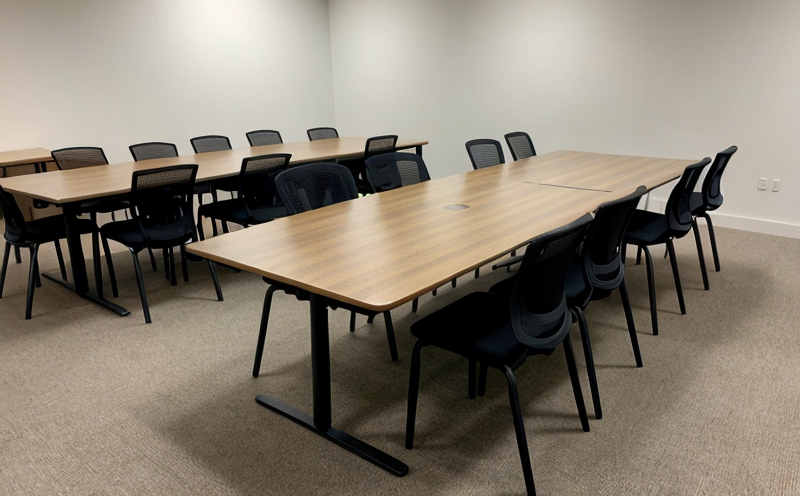BS EN 14072 Glass in Furniture Strength and Durability for Table Tops Testing
The British Standard (BS) EN 14072 specifies the requirements, test methods, and acceptance criteria for glass used in furniture products such as tables and desks. This standard is essential for manufacturers who wish to ensure their products meet stringent quality and safety standards before they enter the market.
When it comes to table tops made of glass, strength and durability are paramount. These properties not only affect the longevity of the product but also play a crucial role in consumer satisfaction and brand reputation. This standard provides a framework for testing these attributes, ensuring that manufacturers can produce high-quality furniture that meets both internal standards and international regulations.
The test procedures outlined in BS EN 14072 are designed to simulate real-world conditions under which the glass table tops will be used. These tests include impact resistance, thermal shock, abrasion resistance, and other relevant parameters. By undergoing these rigorous tests, manufacturers can verify that their products meet the necessary standards for safety and durability.
Impact resistance is a critical aspect of this testing process as it ensures that the glass table tops can withstand accidental impacts without shattering or causing injury. This is particularly important in environments where heavy objects may be placed on top of the tables, such as offices, schools, and homes. Thermal shock tests simulate rapid temperature changes, which help to determine how well the glass can handle extreme conditions, such as being left outside during a sudden change in weather.
Abrasion resistance is another important factor that must be considered when testing glass table tops. Over time, constant contact with abrasive materials like paper or pencils can cause wear and tear on the surface of the glass. By conducting abrasion tests according to BS EN 14072, manufacturers can ensure their products will maintain a smooth finish even after prolonged use.
Manufacturers who comply with these standards gain several advantages. They demonstrate their commitment to quality control, which is essential for building trust among consumers and maintaining brand integrity. Compliance also opens up opportunities for international trade, as many countries have adopted similar standards or require compliance with specific ISO or EN standards.
- Enhanced Consumer Trust: By meeting these stringent requirements, manufacturers can reassure customers that their products are safe and reliable.
- Increased Market Access: Compliance with international standards makes it easier for companies to export their products globally.
- Better Brand Reputation: Consistent quality ensures consistent product performance, leading to positive reviews and repeat business.
In summary, adhering to BS EN 14072 is crucial for any company involved in the production of glass furniture. It provides a comprehensive set of guidelines that help ensure the safety, durability, and quality of table tops made from glass.
Benefits
- Enhanced Consumer Trust: By meeting these stringent requirements, manufacturers can reassure customers that their products are safe and reliable.
- Increased Market Access: Compliance with international standards makes it easier for companies to export their products globally.
- Better Brand Reputation: Consistent quality ensures consistent product performance, leading to positive reviews and repeat business.
- Innovation: Adhering to these standards encourages continuous improvement in product design and manufacturing processes.
- Regulatory Compliance: Meeting the requirements of BS EN 14072 helps ensure that products meet regulatory requirements, avoiding potential legal issues.
- Safety: The rigorous testing ensures that all products are safe for use in various environments and under different conditions.
- Eco-Friendly Production: Compliance with international standards often includes sustainable production practices, reducing the environmental impact of manufacturing processes.
Why Choose This Test
The BS EN 14072 glass in furniture strength and durability test is an essential step for manufacturers looking to produce high-quality, safe, and durable table tops. By adhering to this standard, companies can ensure that their products meet the necessary requirements for safety and performance.
Manufacturers who choose to undergo this testing process benefit from increased consumer trust, better brand reputation, and enhanced market access. These advantages are particularly important in a competitive industry where maintaining high standards is crucial for success. In addition, compliance with international standards helps ensure regulatory compliance, which can prevent potential legal issues.
The rigorous nature of the BS EN 14072 test ensures that products meet stringent safety and durability criteria. This testing process helps manufacturers identify any weaknesses in their products early on, allowing them to make necessary improvements before the product reaches the market. By doing so, they can avoid costly recalls and other negative consequences associated with substandard products.
Moreover, adherence to this standard promotes innovation by encouraging continuous improvement in product design and manufacturing processes. This focus on quality not only enhances the overall performance of the product but also sets a benchmark for excellence within the industry.
Quality and Reliability Assurance
The BS EN 14072 glass in furniture strength and durability test is an important tool for ensuring the quality and reliability of table tops made from glass. This standard provides manufacturers with a comprehensive set of guidelines that help them produce high-quality products.
By conducting these tests, manufacturers can ensure that their products meet all necessary safety and performance criteria. This testing process helps identify any weaknesses in the design or manufacturing process early on, allowing for timely corrections before the product reaches the market. Early detection of issues ensures that potential problems are resolved promptly, reducing the risk of costly mistakes later down the line.
The rigorous nature of this standard also promotes continuous improvement in product design and manufacturing processes. This focus on quality not only enhances the overall performance of the product but also sets a benchmark for excellence within the industry. By adhering to these standards, manufacturers can build trust with their customers, ensuring that they receive products that consistently meet or exceed expectations.





